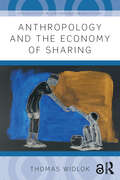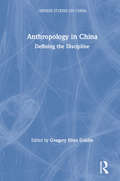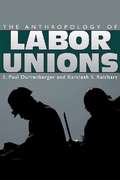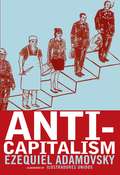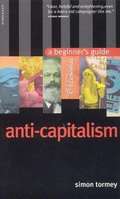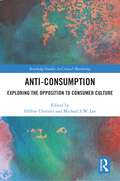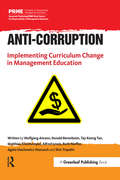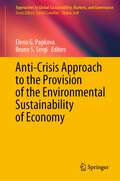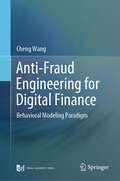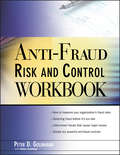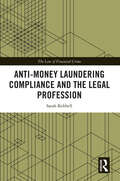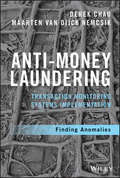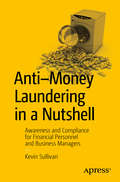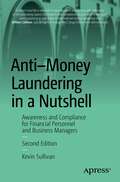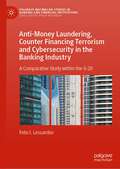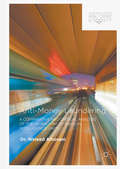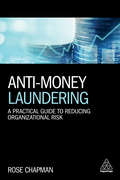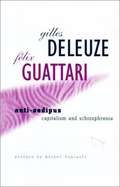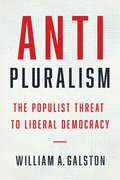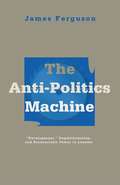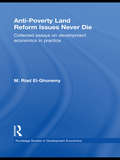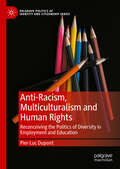- Table View
- List View
Anthropology and the Economy of Sharing (Critical Topics in Contemporary Anthropology)
by Thomas WidlokThis book examines the economy of sharing in a variety of social and political contexts around the world, with consideration given to the role of sharing in relation to social order and social change, political power, group formation, individual networks and concepts of personhood. Widlok advocates a refreshingly broad comparative approach to our understanding of sharing, with a rich range of material from hunter-gatherer ethnography alongside debates and empirical illustrations from globalized society, helping students to avoid Western economic bias in their thinking. Anthropology and the Economy of Sharing also demonstrates that sharing is distinct from gift-giving, exchange and reciprocity, which have become dominant themes in economic anthropology, and suggests that a new focus on sharing will have significant repercussions for anthropological theory. Breaking new ground in this key topic, this volume provides students with a coherent and accessible overview of the economy of sharing from an anthropological perspective.
Anthropology and the Economy of Sharing (Critical Topics in Contemporary Anthropology)
by Thomas WidlokThis book examines the economy of sharing in a variety of social and political contexts around the world, with consideration given to the role of sharing in relation to social order and social change, political power, group formation, individual networks and concepts of personhood. Widlok advocates a refreshingly broad comparative approach to our understanding of sharing, with a rich range of material from hunter-gatherer ethnography alongside debates and empirical illustrations from globalized society, helping students to avoid Western economic bias in their thinking. Anthropology and the Economy of Sharing also demonstrates that sharing is distinct from gift-giving, exchange and reciprocity, which have become dominant themes in economic anthropology, and suggests that a new focus on sharing will have significant repercussions for anthropological theory. Breaking new ground in this key topic, this volume provides students with a coherent and accessible overview of the economy of sharing from an anthropological perspective.The Open Access version of this book, available at http://www.taylorfrancis.com, has been made available under a Creative Commons Attribution-ShareAlike (CC BY-SA) 4.0 license. Open Access funding of this book was made possible through the Leo Spitzer Prize of the University of Cologne. This generous funding is gratefully acknowledged.
Anthropology in China: Defining the Discipline
by Gregory Eliyu GuldinThis book previously published in 2015 as vol. 20, no. 4 and vol. 21, no. 1 of Chinese sociology and anthropology". Seventh section of Chinese Studies on China series.
Anthropology of Labor Unions
by E. Paul Durrenberger Karaleah S. ReichartThe Anthropology of Labor Unions presents ethnographic data and analysis in eight case studies from several very diverse industries. It covers a wide range of topics, from the role of women and community in strikes to the importance of place in organization, and addresses global concerns with studies from Mexico and Malawu. Union-organized workplaces consistently afford workers higher wages and better pensions, benefits, and health coverage than their nonunion counterparts. In addition, women and minorities who belong to unions are more likely to receive higher wages and benefits than their nonunion peers. Given the economic advantages of union membership, one might expect to see higher rates of organization across industries, but labor affiliation is at an all-time low. What accounts for this discrepancy? The contributors in this volume provide a variety of perspectives on this paradox, including discussions of approaches to and findings on the histories, cultures, and practices of organized labor. They also address substantive issues such as race, class, gender, age, generation, ethnicity, health and safety concerns, corporate co-optation of unions, and the cultural context of union-management relationships. The first to bring together anthropological case studies of labor unions, this volume will appeal to cultural anthropologists, social scientists, sociologists, and those interested in labor studies and labor movements.
Anti-Americanism and the Rise of World Opinion
by Monti Narayan DattaIn recent years, the US has seen its public popularity ratings around the world plummet under the presidency of George W. Bush, and subsequently soar upon the election of Barack Obama. The issue of anti-Americanism has received considerable attention from policy-makers, pundits and scholars alike. It is perhaps surprising then that systematic empirical studies of its consequences are still few and far between. Drawing from a wealth of research data, interviews and surveys of social media, this book directly examines pro- and anti-American views and asks what we can learn about the nature and impact of world opinion. By treating anti-Americanism as a case study of public opinion at work, Professor Datta reveals how we can better understand the relationship between global citizens and their political leaders, and concludes that anti-Americanism does in fact substantially impact US security, as well as its economic and political interests.
Anti-Capitalism
by Ezequiel Adamovsky Marie TrigonaIn Anti-Capitalism, activist and scholar Ezequiel Adamovsky tells the story of the long-standing effort to build a better world, one without an abusive system at its heart. Backed up by arresting, lucid images from the radical artist group United Illustrators, Adamovsky details the struggle against rising corporate power, as that struggle unfolds in the halls of academia, in the pages of radical newspapers, and in the jungles and the streets. From Marx through the Battle of Seattle and beyond, Adamovsky traces the beliefs and politics of the major figures in the anticapitalist tradition and explores modern experiments in building different ways of living, in the process providing an indispensible primer for anyone interested in finding alternatives to the so-called "best system we have"--and anyone interested in joining the fight.
Anti-Capitalism: A Beginner's Guide
by Simon TormeySpecifically, the book tackles the questions: Who exactly are the anti-capitalists and what do they want? Simon Tormey examines the ideas of the various components that make up the movement: the anarchists and Marxists, the greens and environmentalists, the anti-corporate activists and utonomists, among many others. He looks in detail at how the movement operates its reliance on a unique combination of word-of-mouth, the internet, and communications technology.
Anti-Consumption: Exploring the Opposition to Consumer Culture (Routledge Studies in Critical Marketing)
by Hélène Cherrier Michael S W LeeIn this edited volume, the leading scholars in the field engage with consumers, marketers, corporations and policymakers as well as space dynamics and network formation to provide an in-depth examination of anti-consumption: a voluntary behavioural inclination to minimise rather than grow, to decelerate and simplify and to reduce the unnecessary exploitation of resources fuelled by consumer culture. This book does not place anti-consumption on the high moral ground but rather demonstrates its complexity to spur innovative and critical thinking on how people, organisations, businesses and governments can treat consumption more as a necessity for survival than as a tool for self-expression, pleasure and economic growth. The first part of this book looks at anti-consumption from a diversity of perspectives. It analyses voluntary simplicity, a self-motivated engagement in consumption reduction, and boycotting, a politically-motivated reaction against unacceptable corporate practices, as distinct manifestations of anti-consumption that nonetheless remain rooted in the logic of the market. Paving the way to critical perspectives on the interface between anti-consumption, people and the environment, the second part of the book projects anti-consumption to issues of waste production and provides possible answers to global challenges of resources depletion, social inequalities and global warming. In this section, anti-consumption is critically assessed as an actor of change, both in terms of social change and paradigm change. To move the field forward, the third part of this book presents several theoretical frameworks that help set a roadmap for future research. Anti-Consumption will be of direct interest to scholars and researchers within the fields of marketing, consumer research, business studies, environmental studies and sustainability. It will also be of value to those researching the economics and/or sociology of markets.
Anti-Corruption: Implementing Curriculum Change in Management Education (The Principles for Responsible Management Education Series)
by Wolfgang Amann Agata Stachowicz-Stanusch Tay Keong Tan Ronald Berenbeim Matthias Kleinhempel Alfred Lewis Ruth Nieffer Shiv TripathiSuccessful businesses are built on trust. Employees and colleagues need to trust one another and they need to deserve and receive trust from customers and suppliers. Anti-Corruption provides resources for building trust through the implementation of comprehensive guidelines on how to professionalize ethics and anti-corruption education worldwide in a variety of classroom settings. It is written and tested by highly experienced program directors, deans and professors, in how to adopt, adapt and develop best teaching practice. It highlights successful patterns, details illustrative case studies and offers clear, hands-on recommendations. Anti-Corruption enables business schools, management-related academic institutions, and Executive Training Programs to embed curriculum change quickly to achieve positive outcomes. It enables degree programs and executive education programs to achieve global standards that will be widely followed.
Anti-Crisis Approach to the Provision of the Environmental Sustainability of Economy (Approaches to Global Sustainability, Markets, and Governance)
by Elena G. Popkova Bruno S. SergiThis book focuses on the notion of the environmental sustainability of the economy. The Sustainable Development Goals, formulated by the UN, led to the formation of a concept of the environmental sustainability of the economy. This concept implies the harmony of economy and environment, achieved due to the support for the SDGs in the economy. This book is original due to its reconsidering the environmental sustainability of the economy from the position of crises. The theoretical significance of the book consists in the development of an anti-crisis approach to the provision of the environmental sustainability of the economy: responsible nature use based on digital markets and smart governance. The proprietary approach allows for the comprehensive description of the potential of the leading technologies—artificial intelligence (AI), robots, the Internet of Things (IoT), and blockchain—to support—during their use in smart governance—crisis management of the environmental sustainability of economy.The book’s practical significance is due to the description and detailed discussion of the modern international experience of responsible nature use given the specifics of developed and developing countries. The anti-crisis approach to the provision of the environmental sustainability of the economy is based on digital markets: FinTech, EdTech, GovTech, AgroTech, and EnergyTech, the practice of which is described in the book with the help of multiple examples from the international experience and case studies. The book is aimed at scholars who study environmental economics. In this book, they find an innovative view of the environmental sustainability of the economy in its close connection with economic crises.
Anti-Europeanism: Critical Perspectives Towards the European Union
by Marco Baldassari Emanuele Castelli Matteo Truffelli Giovanni VezzaniThe book analyzes different critical attitudes towards European integration from a multidisciplinary perspective. By applying both quantitative and normative-theoretical approaches, the contributors assess the causes and effects of the popularity of EU-critical positions and doctrines, such as souverainism, neo-nationalism and neo-populism. The book also presents country studies to compare populist movements and parties, such as the Five Stars Movement in Italy, Syriza in Greece and UKIP in the UK. It offers insights into the historical and normative roots of the diverse anti-European standpoints, and the various political demands and agendas connected with these views, ranging from rejections of EU institutions to demands for institutional reforms and propositions for alternative projects.
Anti-Fraud Engineering for Digital Finance: Behavioral Modeling Paradigm
by Cheng WangThis book offers an introduction to the topic of anti-fraud in digital finance based on the behavioral modeling paradigm. It deals with the insufficiency and low-quality of behavior data and presents a unified perspective to combine technology, scenarios, and data for better anti-fraud performance. The goal of this book is to provide a non-intrusive second security line, rather than replaced with existing solutions, for anti-fraud in digital finance. By studying common weaknesses in typical fields, it can support the behavioral modeling paradigm across a wide array of applications. It covers the latest theoretical and experimental progress and offers important information that is just as relevant for researchers as for professionals.
Anti-Fraud Risk and Control Workbook
by Peter Goldmann Hilton KaufmanProven guidance for fraud detection and prevention in a practical workbook formatAn excellent primer for developing and implementing an anti-fraud program, Anti-Fraud Risk and Control Workbook engages readers in an absorbing self-paced learning experience to develop familiarity with the practical aspects of fraud detection and prevention.Whether you are an internal or external auditor, accountant, senior financial executive, accounts payable professional, credit manager, or financial services manager, this invaluable resource provides you with timely discussion on:Why no organization is immune to fraudThe human element of fraudInternal fraud at employee and management levelsConducting a successful fraud risk assessmentBasic fraud detection tools and techniquesAdvanced fraud detection tools and techniquesWritten by a recognized expert in the field of fraud detection and prevention, this effective workbook is filled with interactive exercises, case studies, and chapter quizzes and shares industry-tested methods for detecting, preventing, and reporting fraud.Discover how to become more effective in protecting your organization against financial fraud with the essential techniques and tools in Anti-Fraud Risk and Control Workbook.
Anti-Money Laundering Compliance and the Legal Profession (The Law of Financial Crime)
by Sarah KebbellMoney laundering is a global issue and there is evidence that the services provided by the legal profession may be misused to launder the proceeds of crime. This book explores the experiences of professionals within Top 50 law firms when seeking to comply with the UK’s anti-money laundering (AML) regime. The book draws upon empirical evidence from 40 in-depth interviews with solicitors and compliance personnel from 20 Top 50 law firms. Access to this section of the legal profession is challenging in the context of academic research, and the research provides an account, seldom heard in academic literature, directly from practitioners. The book uses these research findings to explore and discuss the AML compliance issues faced by this section of the profession. It highlights the challenges presented by the legislative architecture of the Proceeds of Crime Act 2002, and considers compliance issues relating to customer due diligence, AML training, the client account and the suspicious activity reporting regime. It also considers participants’ perceptions of the regime, their role within it, and their own assessment of money laundering risk. It concludes by using this evidence to recommend amendments to current AML policy and legislation. This book will be of interest to students and researchers studying Financial Crime Law, Business and Company Law, and White Collar Crime, as well as policy makers in the areas of money laundering, compliance, and corruption.
Anti-Money Laundering Transaction Monitoring Systems Implementation: Finding Anomalies (Wiley and SAS Business Series)
by Derek Chau Maarten van NemcsikEffective transaction monitoring begins with proper implementation Anti-Money Laundering Transaction Monitoring Systems Implementation provides comprehensive guidance for bank compliance and IT personnel tasked with implementing AML transaction monitoring. Written by an authority on data integration and anti-money laundering technology, this book offers both high-level discussion of transaction monitoring concepts and direct clarification of practical implementation techniques. All transaction monitoring scenarios are composed of a few common elements, and a deep understanding of these elements is the critical factor in achieving your goal; without delving into actual code, this guide provides actionable information suitable for any AML platform or solution to help you implement effective strategies and ensure regulatory compliance for your organization. Transaction monitoring is increasingly critical to banking and business operations, and the effectiveness of any given solution is directly correlated to its implementation. This book provides clear guidance on all facets of AML transaction monitoring, from conception to implementation, to help you: Detect anomalies in the data Handle known abnormal behavior Comply with regulatory requirements Monitor transactions using various techniques Regulators all over the world are requiring banks and other companies to institute automated systems that combat money laundering. With many variables at play on both the transaction side and the solution side of the equation, a solid understanding of AML technology and its implementation is the most critical factor in successful detection. Anti-Money Laundering Transaction Monitoring Systems Implementation is an invaluable resource for those tasked with putting these systems in place, providing clear discussion and practical implementation guidance.
Anti-Money Laundering in a Nutshell: Awareness and Compliance for Financial Personnel and Business Managers
by Kevin SullivanAnti-Money Laundering in a Nutshellis a concise, accessible, and practical guide to compliance with anti-money laundering law for financial professionals, corporate investigators, business managers, and all personnel of financial institutions who are required, under penalty of hefty fines, to get anti-money laundering training. Money laundering is endemic. As much as 5 percent of global GDP ($3. 6 trillion) is laundered by criminals each year. It''s no wonder that every financial institution in the United States--including banks, credit card companies, insurers, securities brokerages, private funds, and money service businesses--must comply with complex examination, training, and reporting requirements mandated by a welter of federal anti-money laundering (AML) laws. Ignorance of crime is no excuse before the law. Financial institutions and businesses that unknowingly serve as conduits for money laundering are no less liable to prosecution and fines than those that condone or abet it. In Anti-Money Laundering in a Nutshell: Awareness and Compliance for Financial Personnel and Business Managers, Kevin Sullivan draws on a distinguished career as an AML agent and consultant to teach personnel in financial institutions what money laundering is, who does it, how they do it, how to prevent it, how to detect it, and how to report it in compliance with federal law. He traces the dynamic interplay among employees, regulatory examiners, compliance officers, fraud and forensic accountants and technologists, criminal investigators, and prosecutors in following up on reports, catching launderers, and protecting the integrity and reputations of financial institutions and businesses. In particular, corporate investigators will gain rich insights winnowed from the author''s experiences as a New York State and federal investigator. What you''ll learn US federal and international AML laws The AML measures and program that financial institutions must have in place to control money laundering, such as KYC, CIP, and AML/CFT risk assessment The practical steps that personnel at every level from the teller window to the C-suite must know to ensure institutional compliance with AML regulations, such as filling out SARs and CTRs Who this book is for Under federal acts such as the Bank Secrecy Act of 1970, the Money Laundering Suppression Act of 1994, and the Intelligence Reform and Terrorism Prevention Act of 2004, every financial institution in the United States must have an anti-money laundering program in place that includes annual training of all relevant employees. This short book is an educational text or supplemental reader for such training by anti-money laundering compliance officers, examiners, agents, and consultants. Table of Contents Chapter 1. What is Money Laundering? Chapter 2. Methods of Money Laundering Chapter 3. Federal Regulations Chapter 4. Building a Quality AML Program for Financial Institutions Chapter 5. Know Your Customer and Customer Identification Program Chapter 6. A SAR Is Born Chapter 7. Money Laundering for Law Enforcement Chapter 8. International Standards Chapter 9. FRAML Glossary Appendix A: Red Flags Appendix B: Code of Federal Regulations Title 31 Section 103. 18
Anti-Money Laundering in a Nutshell: Awareness and Compliance for Financial Personnel and Business Managers
by Kevin SullivanAnti–Money Laundering in a Nutshell is a concise, accessible, and practical guide to compliance with anti–money laundering law for financial professionals, corporate investigators, business managers, and all personnel of financial institutions who are required, under penalty of hefty fines, to get anti–money laundering training. This new edition of Anti-Money Laundering will update the topics discussed, and introduce the changes and updates including information on the AMLA Act of 2020, new EU standards and directives, anti-money laundering on digital currencies and more.Money laundering is endemic. As much as 5 percent of global GDP ($3.6 trillion) is laundered by criminals each year. It’s no wonder that every financial institution in the United States—including banks, credit card companies, insurers, securities brokerages, private funds, and money service businesses—must comply with complex examination, training, and reporting requirements mandated by a welter of federal anti–money laundering (AML) laws. Ignorance of crime is no excuse before the law. Financial institutions and businesses that unknowingly serve as conduits for money laundering are no less liable to prosecution and fines than those that condone or abet it.In Anti–Money Laundering in a Nutshell: Awareness and Compliance for Financial Personnel and Business Managers, Kevin Sullivan draws on a distinguished career as an AML agent and consultant to teach personnel in financial institutions what money laundering is, who does it, how they do it, how to prevent it, how to detect it, and how to report it in compliance with federal law. He traces the dynamic interplay among employees, regulatory examiners, compliance officers, fraud and forensic accountants and technologists, criminal investigators, and prosecutors in following up on reports, catching launderers, and protecting the integrity and reputations of financial institutions and businesses. In particular, corporate investigators will gain rich insights winnowed from the author's experiences as a New York State and federal investigator.
Anti-Money Laundering, Counter Financing Terrorism and Cybersecurity in the Banking Industry: A Comparative Study within the G-20 (Palgrave Macmillan Studies in Banking and Financial Institutions)
by Felix I. LessamboDespite massive investments in mitigation capabilities, financial crime remains a trillion-dollar global issue with impacts that extend well beyond the financial services industry. Worldwide, there are between $800 billion and $2 trillion laundered annually with the United States making up at least $300 billion of that figure. Although it is not possible to measure money laundering in the same way as legitimate economic activity, the scale of the problem is considered enormous. The cybersecurity landscape is always shifting, with threats becoming more sophisticated all the time. Managing risks in the banking and financial sectors requires a thorough understanding of the evolving risks as well as the tools and practical techniques available to address them. Cybercrime is a global problem, which requires a coordinated international response. This book outlines the regulatory requirements that come out of cyber laws and showcases the comparison in dealing with AML/CFT and cybersecurity among the G-20, which will be of interest to scholars, students and policymakers within these fields.
Anti-Money Laundering: A Comparative and Critical Analysis of the UK and UAE's Financial Intelligence Units (Palgrave Studies in Risk, Crime and Society)
by Waleed AlhosaniThis book critically analyses the role of theUnited Arab Emirates Financial Intelligence Unit (FIU) in the SuspiciousActivities Reports regime. The author pays particular attention to itsfunctions and powers in dealing with Suspicious Activities Reports and relevantrequirements imposed upon the reporting entities. In the analysis, the authoralso compares the United Arab Emirates FIU model to the United Kingdom FIUmodel. In addition, the book investigates whetherthe current United Arab Emirates FIU model complies with the relevantinternational recommendations developed by the Financial Action Task Force inrelation to the establishment of the unit, as well as its powers and functions. Thisbook suggests that more can be done toimprove the current functions and powers of the United Arab Emirates FIU in aninternational context. Furthermore, the author suggests that the functions and powers of the United FIUmodel both comply with the international requirements and beneficially extendbeyond their directives.
Anti-Money Laundering: A Practical Guide to Reducing Organizational Risk
by Rose ChapmanIt is estimated that between 2 and 5 per cent of global GDP (over $3 trillion) is laundered by criminals around the world every year. Once thought to be a problem which only affected banks and the financial services sector, high profile cases, such as the recent leak of the Panama Papers in 2016, have thrust the issue into the public arena, and governments around the world are being forced to put robust systems and controls in place. Anti-Money Laundering offers a cost-effective self-development tool for the busy compliance professional eager to progress their career and in need of an accessible, practical and jargon-free introduction to anti-money laundering (AML).Anti-Money Laundering offers a practical guide to navigate the maze of requirements needed to counter money laundering in an organization. This book separates the different elements of AML practice, featuring a range of case studies and scenarios highlighting issues and best practices around the world. The text demonstrates that it is by foresight and methodology that AML can be mitigated, and provides clarity on complex points to better enable readers to gain the expertise they need to achieve success in practice.
Anti-Oedipus: Capitalism and Schizophrenia
by Gilles Deleuze Félix GuattariThis is an essential text for feminists, literary theorists, social scientists, philosophers, and others interested in the problems of contemporary Western culture.
Anti-Pluralism: The Populist Threat to Liberal Democracy (Politics and Culture)
by William A. GalstonThe Great Recession, institutional dysfunction, a growing divide between urban and rural prospects, and failed efforts to effectively address immigration have paved the way for a populist backlash that disrupts the postwar bargain between political elites and citizens. Whether today’s populism represents a corrective to unfair and obsolete policies or a threat to liberal democracy itself remains up for debate. Yet this much is clear: these challenges indict the triumphalism that accompanied liberal democratic consolidation after the collapse of the Soviet Union. To respond to today’s crisis, good leaders must strive for inclusive economic growth while addressing fraught social and cultural issues, including demographic anxiety, with frank attention. Although reforms may stem the populist tide, liberal democratic life will always leave some citizens unsatisfied. This is a permanent source of vulnerability, but liberal democracy will endure so long as citizens believe it is worth fighting for.
Anti-Politics Machine: Development, Depoliticization, and Bureaucratic Power in Lesotho
by James FergusonDevelopment, it is generally assumed, is good and necessary, and in its name the West has intervened, implementing all manner of projects in the impoverished regions of the world. When these projects fail, as they do with astonishing regularity, they nonetheless produce a host of regular and unacknowledged effects, including the expansion of bureaucratic state power and the translation of the political realities of poverty and powerlessness into "technical" problems awaiting solution by "development" agencies and experts. It is the political intelligibility of these effects, along with the process that produces them, that this book seeks to illuminate through a detailed case study of the workings of the "development" industry in one country, Lesotho, and in one "development" project. Using an anthropological approach grounded in the work of Foucault, James Ferguson analyzes the institutional framework within which such projects are crafted and the nature of "development discourse," revealing how it is that, despite all the "expertise" that goes into formulating development projects, they nonetheless often demonstrate a startling ignorance of the historical and political realities of the locale they are intended to help. In a close examination of the attempted implementation of the Thaba-Tseka project in Lesotho, Ferguson shows how such a misguided approach plays out, how, in fact, the "development" apparatus in Lesotho acts as an "anti-politics machine," everywhere whisking political realities out of sight and all the while performing, almost unnoticed, its own pre-eminently political operation of strengthening the state presence in the local region.James Ferguson is an associate professor of anthropology at the University of California at Irvine.
Anti-Poverty Land Reform Issues Never Die: Collected essays on development economics in practice (Routledge Studies in Development Economics)
by M. Riad El-GhonemyWhat can we do to unlock the unrealised potential of the hundreds of millions of rural poor and landless workers? The ever-topical central theme in this collection of essays is the mixed role of government and the institutionally regulated market in tackling rural poverty and land distribution inequality. Drawing on over half a century of M. Riad El-Ghonemy’s academic and field experience in developing countries across Africa, Latin America, the Middle East and South East Asia, this is a comprehensive record of the late-twentieth century study of and struggle against rural inequality, seen through the eyes of one of its foremost observers. Containing a balance of in-depth field studies and El-Ghonemy’s personal observations from 1952 onwards, this volume provides the basis for discussion and debate on a range of developmental issues. Foremost among these is the appropriate approach both to explain the factors underlying developing countries' rural backwardness, and to enable them to achieve the Millennium Development Goal of halving the incidence of poverty and hunger by 2015. The compelling argument made here is that redistributive land reform, combined with non-farm intensive employment opportunities and investment in education within rural areas are necessary to tackle persistent poverty effectively. Anti-Poverty Land Reform Issues Never Die is essential reading for undergraduate and postgraduate students learning rural development and institutional and development economics. M.Riad El-Ghonemy is Senior Research Associate at the Department of International Development, University of Oxford and Research Fellow at the Department of Economics, the American University in Cairo, and Emeritus Professor, Ein-Shams University, Cairo. He is the author of several publications, including The Political Economy of Rural Poverty, Routledge (1990).
Anti-Racism, Multiculturalism and Human Rights: Reconceiving the Politics of Diversity in Employment and Education (Palgrave Politics of Identity and Citizenship Series)
by Pier-Luc DupontThe continuing prevalence of racial inequality and discrimination is well documented in Britain. While there are multiple accounts of how state institutions are shaped by and reproduce racism, much less has been said about their current and potential contribution to anti-racism. This book elucidates the long-term impact on racism of positive action in employment and multicultural school curricula. It also explores whether international human rights law creates a duty for states to adopt these policies. Positive action and multicultural curricula are not new and have long been advocated by multiculturalists, but this book systematically unpacks how they can counter four structural drivers of racism: racialised national identities, racialised power inequalities, racial fearmongering, and racial segregation. The book goes on to examine the extent to which they have been implemented in Britain, as well as the legal and political opportunities for future development.
